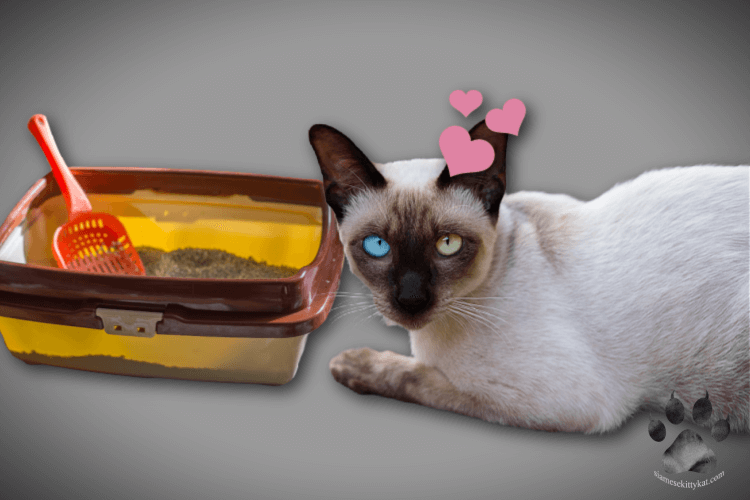Cleaning a Siamese cat’s litter box can be an unpleasant yet necessary task. We understand how daunting it may seem to take on. Not only does the litter box need to be cleaned on a regular basis. It also needs to be done in the correct way to protect your cat’s health.
Fortunately, this task doesn’t have to be difficult or time-consuming. You just need to know the right steps and tips for litter box maintenance.
This guide will provide you with a step-by-step instruction on how to clean your Siamese cat’s litter box. Keep reading to learn more!
What is the Easiest Way to Clean a Cat’s Litter Box?
1. The first step in cleaning a litter box is to dump the entire contents of the box. This will ensure any clumped material or debris is removed from the box before it can create unpleasant odors.
2. You should then soak the entire litter box in hot water for at least a few minutes. The temperature should be warm enough that it will still be comfortable for your hands. However, it should be hot enough for it to break down any solid waste in the litter box.
3. You can add a small amount of liquid dish soap to the hot water. Be sure not to use too much, as this can leave behind a toxic residue that could harm your cat.
4. You’ll want to scrub down all sides and surfaces of the litter box, using either a soft cloth or brush.
Do not use abrasive cleaners such like bleach or vinegar. These are too harsh for cats’ sensitive noses and coats. It’s best to stick with warm water plus soap to rinse away debris.
5. You should dry it completely before adding fresh litter once it is clean. Place several paper towels or newspaper in the bottom of the pan. You can also use an absorbent cloth and let it sit until all excess moisture has dried up.
Do not use towels that might leave behind lint, as they could stick to your cat’s fur when they enter the litter box.
How Do You Train a Siamese Cat to Use a Litter Box?
There are a few things to keep in mind when training a Siamese cat to use a litter box.
1. Begin by assembling the supplies you’ll need for training. You should choose the right type of litter box and quality litter.
Standard open boxes are widely available, but some cats may prefer covered or hooded boxes for more privacy. You will want to have several large boxes for multiple cats, so each cat has their own space.
A good litter for cats is fine-grained, unscented clumping litter.
It is helpful to place a mat under the box to make cleanup easier after your cat has used it. Look for a low-sided box if your Siamese cat is elderly or has mobility issues. This will make it easier for them to get in and out of their designated bathroom area.
The litter box should be located in a quiet area of your house where they won’t feel stressed or interrupted while using it.
2. You can introduce your Siamese cat to the litter box once the supplies are in place. Start by telling him the location of the box. Put him in front of it and let him explore for a few moments without distracting him.
Praise them when they approach the litter box and offer treats if they go inside it. You may also want to gently pick up and place your cat inside after meals and naps.
Be sure not to get angry or frustrated if your cat doesn’t want anything to do with it at first. Try instead using gentle words of encouragement after each successful attempt at using their designated spot.
3. It might take some time for your Siamese cat to fully adjust to using the litter box on its own. Kittens may take up to one month before they understand what the purpose of their litter box is.
Don’t be too discouraged if there are some accidents. Continue reinforcing goof behavior whenever your cat uses it correctly.
Cats learn through repetition and consistency, so don’t expect too much too quickly. Your kitten will learn how to best to do her business as long as you remain patient.
Do Cats Like When You Clean Their Litter Box?

Yes. Cats enjoy it when their humans take the time to clean their litter boxes. They prefer a clean and hygienic environment, and they know they will get it when we scoop up the mess.
How do you know if your cat is happy with how you are taking care of its litter box? A few signs your cat trusts and appreciates your cleaning efforts are:
These are all part of showing how happy they are when you took care of things for them.
Why Do Cats Watch You Clean Their Litter Box?
Every cat owner has experienced the stare of their beloved pet while they are cleaning their litter box. Why is it that cats seem to be interested in our cleaning routine?
1. Cats are naturally inquisitive creatures. They notice when they see their owner cleaning the litter box.
Cats want to know what you’re doing and why you’re taking away something that belongs to them.
2. Cats may watch us clean the litter box out of boredom, since there isn’t much else for them to do. Watching us clean might give them something interesting and novel to watch.
3. Our cats might simply be trying to show us affection. Your cat sees you cleaning his litter box and wants to connect with you by being present. After all, cats love spending time with their human companions.
4. Cats are territorial, and they consider their litter box to be part of their space. A cat’s litter box is like his personal bathroom, and he wants to make sure no other cats are using it.
Your cat may assume you are trying to take away his treasured spot when you enter into their private space with a scoop. To them, it’s an act of intrusion on their territory. Thus, he’ll use his body language and facial expressions to communicate his displeasure.
My Siamese cat, Batman, is quite the curious creature. He watches me intently every time I clean out his litter box. It’s as if he wants to help me get the job done.
He loves being around people and often follows me wherever I go in the house. He’ll come running over when it was time to scoop out his litter box to see what was going on.
What Happens if a Litter Box isn’t Clean?
Cleaning your cat’s litter box is one of the most important tasks when it comes to proper cat care. As dirty litter box can be more than just an unpleasant odor. It can have dangerous side effects on your cat’s health.
1. A common issue that arises from an unclean litter box is a urinary tract infection. A UTI is caused when bacteria from the waste builds up and travels up your cat’s urethra. UTIs are painful, uncomfortable, and dangerous if left untreated.
Some of the common symptoms of feline UTIs are:
Your cat should be taken to the vet for diagnosis and treatment.
2. Cats can suffer from skin problems or respiratory issues caused by old waste. Parasites like fleas or worms may also find refuge in dirty litter boxes. This could pose a danger to both you and your cat.
3. Cats faced with an unsanitary litter box may resort to inappropriate behaviors. This includes urinating or defecating outside the box or on furniture.
4. A dirty litter box can create an unpleasant smell that lingers throughout your house. This invites pests like flies into your home, which can further create health risks for you and your cat.
5. The most common issue for humans is an overexposure to ammonia. This toxic gas can cause problems like headaches or nausea if breathed in over extended periods. It has been known to cause pneumonia in extreme cases.
6. Dirty litter boxes carry an increased risk of zoonotic disease. Cat scratch fever, or bartonellosis, is one such example. This disease can cause fatigues, headaches, body aches, and fever in humans who come into contact with contaminated pet waste.
7. A dirty litter box can cause bacterial infections such as salmonellosis. Cats can harbor Salmonella bacteria in their digestive tract and will show signs of illness. These include diarrhea, decreased appetite, fever, lethargy, or vomiting.
You could become ill as well if you come into contact with these bacteria through a dirty litter box. People who clean out litter boxes without wearing gloves are vulnerable to this type of illness.
How Do You Keep Cat Litter Smell Free?

1. The first and foremost rule for preventing cat litter odor is to clean it regularly. That means scooping the box at least twice a day. It’s even more important to clean the box daily if you have multiple cats. Their combined waste will cause more odor build-up.
2. Natural litters will usually do a better job of controlling odor than synthetics like foam or crystal varieties. Natural litters absorb moisture and contain odor-fighting properties.
Try combining an unscented clumping litter with baking soda to help neutralize bad smells.
3. Good ventilation is key for keeping any space smelling fresh, including your cat’s litter box area. Make sure there is plenty of airflow in this area by opening windows or using an air purifier. This will help pull out bad smells from the room before they become overwhelming.
4. Another tip to help keep cat litter smell free is investing in a high quality air filter system. These work by filtering out airborne particles such as dust, pollen, dander, and other allergens from the air. Air filters can be used in conjunction with other methods, such as using scented candles or room fresheners with natural essential oils.
5. Choose odor-resistant cat food. Not all cat food creates equal amounts of smell, so do some research into what type would work best for your feline friend. Cat food containing fish tends to create fewer odors than foods containing meat products such as poultry or beef.
However, some cats may not respond positively or be able to digest food with fish ingredients. Check with your veterinarian first before making any changes in your cat’s diet.
Do Cats Hate it When You Change Their Litter?
Cats are creatures of habit and prefer consistency in their daily lives. This includes everything from their diet, the type of bedding they sleep on, and even the kind of litter they use. It can cause stress for cats when these are changed.
Consider how your cats will react when changing the type of litter. Some cats may adapt well to a new litter. Others may take some time getting used to a new one.
Start off slow by offering your cat different types of litters if this is the case. This way, he’ll still have several others he’s comfortable with if he hates one particular kind.
Conclusion
Siamese cats, like all felines, are meticulous animals who want a tidy and comfortable space to do their business in. Thus, it is important that their litter boxes are kept clean at all times.
Taking care of a Siamese cat’s litter box does not have to be a daunting task with these helpful steps in mind. Rather, it is an easy part of owning this beautiful breed.
We gathered all the health tips tailored toward maintaining your Siamese cat’s optimal well-being. Check it out here: Siamese Cat Health: A Complete Guide

